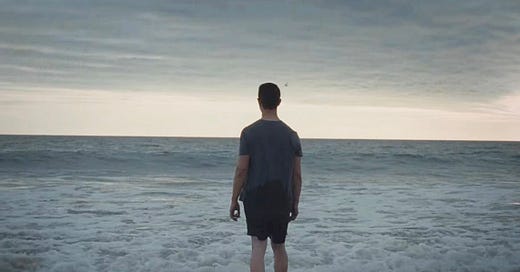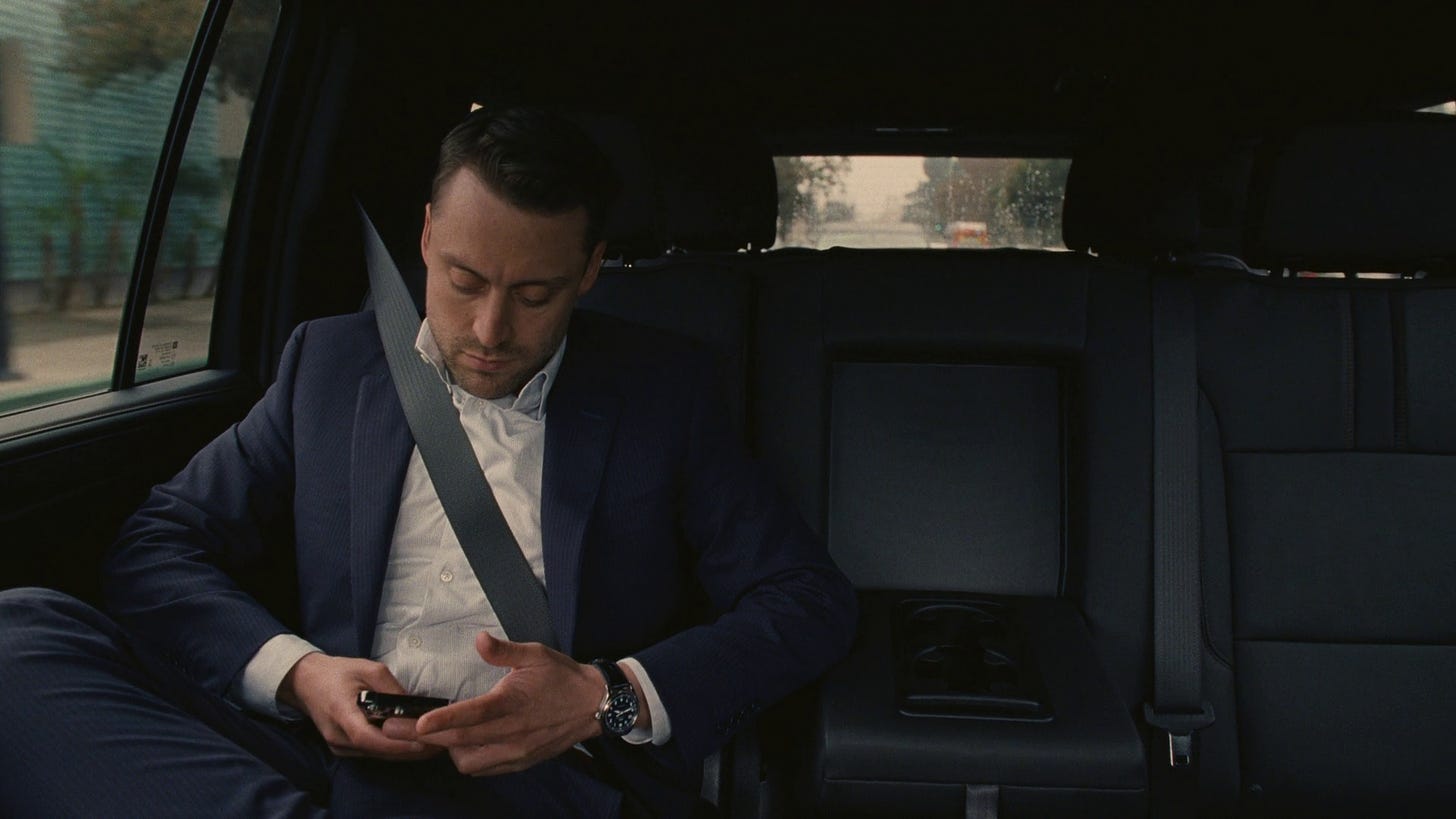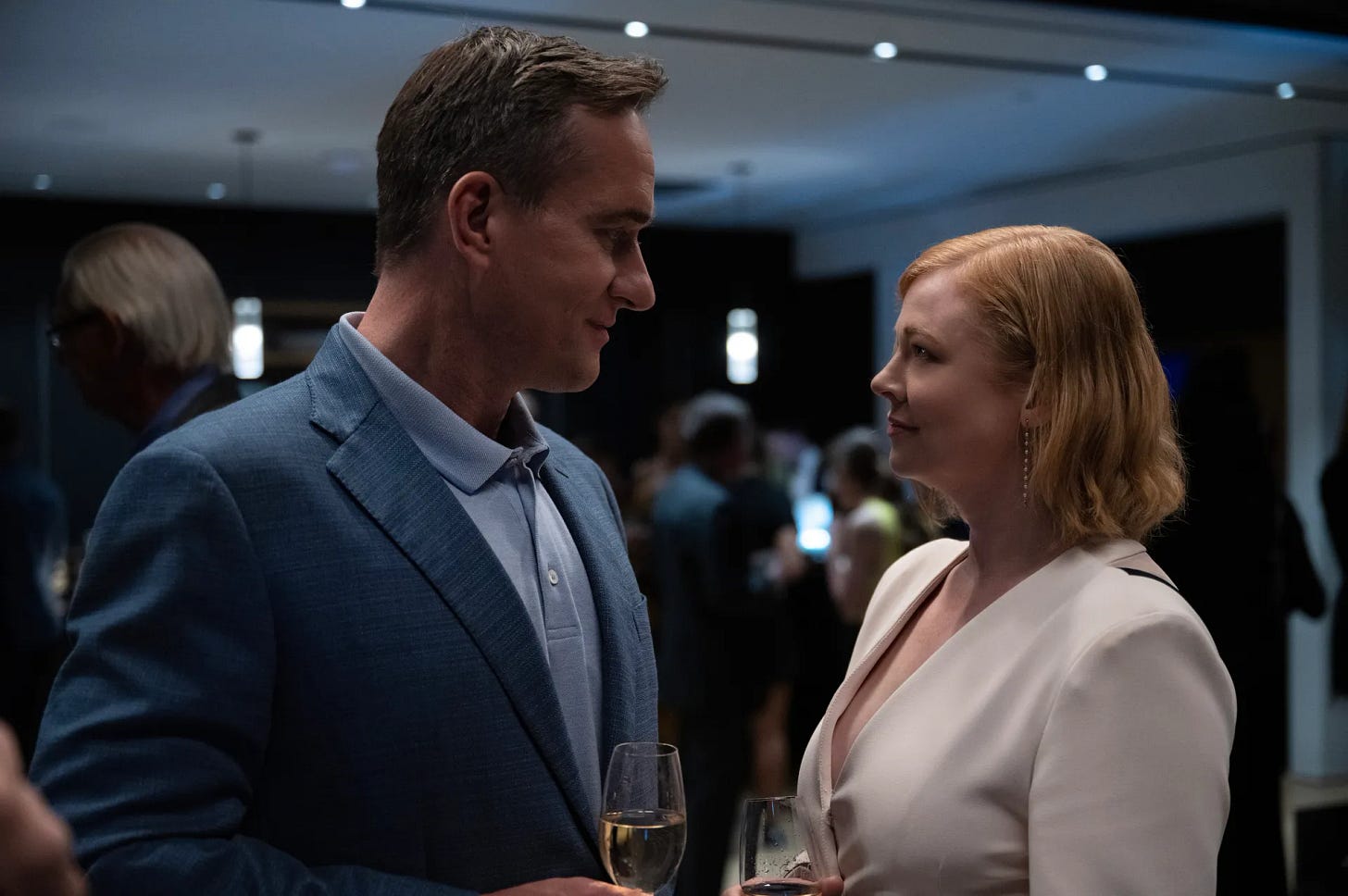Succession Ensemble Report: Weak Monarchs, Dangerous Interregnums
We're beyond the halfway point of Succession's final season and things are getting theatrical and cinematic.
After episodes one and two, I gave an ensemble report on the status of Succession’s hopeful heirs to Logan Roy (including Logan himself). Since then, Shiv gets cast by the wayside, Tom is in a social climber’s free-fall, Greg is cosplaying as a robot doormat and Logan dies on a plane. The three siblings have been “closer” than ever, and the home stretch of this final season feels like an ode to each of their characters, Jesse Armstrong’s ode to art, drama and classicism through deep dives into the Roy children’s stories and what makes them so tragic, ambitious, divisive, misguided and unserious.
Enter “Living+”, Sunday’s episode that spends the day with the Roy kids as they embark on an ill-timed product launch of a glorified retirement community, despite Lukas Matsson’s wishes. On the heels of an emotionally triumphant episode six for Kendall, a strenuous but sexy one for Shiv and one marred in self-hatred for Roman, let’s dive into where we’re at emotionally (and physically) with the golden trust fund children of prime time television.
Kendall - “Big, big shoes. Big, big shoes.”
In my last piece about Succession, I compared Kendall to Shakespeare’s Hamlet:
“They’re both princes of their empire, angling for a prize they believe is their birthright, an epic tale ripe with familial backstabbing and innocent deaths. They’re also similar people, similarly enigmatic, viewed by various audiences differently based on whatever life experiences lead up to the moment they watch the play, or the TV show. Both characters are brooding, depressed, and loathsome of what they believe is a bleak and certain fate. Hamlet, much like Kendall, manages to leverage his position as an out-of-touch royal to remain inventive and existential. Kendall, like Hamlet, vaguely acknowledges the terror his ilk disseminates across culture, but absolves his personal guilt by championing the idea that societal ills are a collective failure, not an individual one.”
I’m not the first to draw the comparison, but it seems more prescient as we move along towards the finale. For one, his harrowing comment to Roman when they inflate the valuation of Living+ to torpedo the deal with Matsson-- “Dude, it’s enough to make you lose your faith in capitalism,”-- speaks to his intelligence in the face of utter disconnection with the real world. On some molecular, obscured level, Ken understands that they are somehow the harbingers of late-stage capitalism while the rest of the world sees their mere existence as proof of a decaying society. There’s still a cognitive dissonance-- despite his charade as a progressive thought-starter, it doesn’t truly resonate with Kendall that he is actively making the world a worse place. These are not inconsequential decisions, and Kendall can only see the ramifications from a personal scope instead of a larger world view. His soul does not possess the same evil as his father’s, but his actions do.
The second time Kendall channels his inner-Hamlet comes in the form of an uncomfortable Logan Roy posthumous appearance at the investor’s meeting in which Kendall announces Living+, the ambiguous “physical social media” lifestyle community that apparently actually exists. Behind the scenes, Greg bullies video editors into making up dialogue that Logan never said in an effort to make Kendall’s highly uncomfortable introduction work. It’s a seminal moment in which, for the first time, he manipulates his dad instead of the other way around. Ken steps on stage and playfully trades jabs back and forth with his dad-- much like Hamlet speaking to the ghost of his father and subsequently deciding to avenge his death-- which gives him some sort of perverse confidence to continue, and eventually deliver a very successful speech.
“The object of the artist is the creation of the beautiful. What the beautiful is is another question.” - James Joyce
There’s something to be said about Kendall and his adherence to the creative process, his belief in assuming the role of a true visionary. Sure, he’s interested in numbers, but in another life he was meant to be an artist himself. He goes about presentations and these high-pressure, high-intensity moments like he’s building his magnum opus, his next masterpiece. Kendall tragically and ironically romanticizes the artfulness he sees in being the CEO of an American media giant.
All through the episode, we see the same arc we have seen in each season of Succession. In classic hero’s journey fashion, every time something good happens to Kendall, he can’t handle the pressure and the happiness is soon followed by a crushing blow. In season one, he derails his path by accidentally killing a waiter in Scotland. In season two, he becomes the butt of every joke after delivering an obnoxiously bad rap in honor of his dad (note: rap hasn’t left his arsenal, as we see him come on stage at investor’s day to Public Enemy’s “Harder Than You Think” in a moment without a semblance of self-awareness, even for Kendall). In season three, Kendall makes a fool out of himself at his own extravagant birthday party. Season four started with Kendall seemingly done with the hero’s trajectory, accepting his role as a puppet child for his dad’s lucrative affairs. Then, Logan dies, and everything changes. We see him regain that “gleam” in his eyes that Shiv finds so foreboding. She knows what comes next.
We see Kendall start to act out like Logan. In preparation for the Living+ speech, he makes everyone around him a yes man; he disregards advice and threats from the Old Guard of Gerri, Karl and Frank; and he changes his mind several times at the last minute, opting out of a playhouse with fake clouds in place of an AI video of his dad speaking down to the crowd. Everyone in the show knows bad news lies ahead. Roman, who is supposed to speak at the meeting along with Kendall, is swayed by Shiv to drop out for his best interest. For a moment, Kendall pulls out of his manic state, and it feels like he realizes how bad things are going to go.
Every fan could see the implosion coming, too. Kendall steps out, miffs the beginning of the speech, acknowledges the teleprompter and brings his dead, estranged dad into the mix. But then, in a moment of masterful irony… the inspired, earnest charm of Kendall begins to work. He cracks jokes about living forever, gives a short but poignant eulogy to lost loved ones and makes this dystopian living community sound like the next frontier of tech media. It’s almost like the weight of Logan Roy is finally off his back, and Ken’s self-proclaimed visionary mind starts to deliver instead of folding at the last minute. He talks “business speak”, but also shares heartfelt moments and grief in the shadows of Logan’s death. We know he wants to say the unsaid to his dad, whatever that means, and we know the idea of living forever is especially appealing to someone as terrified of mortality as Kendall.
Instead of careening towards an inevitable implosion that will surely kill his chances of moving forward as CEO and likely his executive future, Kendall corrects his wayward course and continues to propel towards his seemingly predetermined fate of kingship. Just like Hamlet.
“The true eye of the earth is water.” - Gaston Bachelard, French Philosopher
After this episode’s seminal moment in the life of Kendall Logan Roy, he tucks off to a beach in Malibu to plunge into and float among the rough Pacific waves. This feels like a pivotal moment-- like something is upon us-- because Succession writers have used water as a symbolic plot device parallel to Kendall throughout the whole show.
Water is the strongest element on earth, strongly associated with the idea of rebirth, and is said to reveal ultimate truths, much like art itself. Kendall’s accident with the waiter happens in the water. In season three, when we’re left with the idea that maybe Kendall is trying to kill himself, we see him face down in a pool. Now, after the biggest moment of Kendall’s professional life, we see him simply buoyant in an endless sea, waves crashing with anger and heavy, charcoal clouds streaking across the firmament. Just like the other times, this doesn’t seem particularly happy.
Is more darkness on the horizon? Kendall carves a “1” in the sand. It’s happy, but it’s melancholic. Roman is distraught. Shiv is distant. Ken’s alone. His dad’s not even here to see his success. What’s the point? What’s the endgame? Should he even want to live forever, in the spirit of Living+? Even Jeremy Strong, a masterful nerd of theater, said of his character in a Vulture profile, “Whatever these moments of triumph are, they are inevitably followed by ‘behind every silver lining, there’s a thundercloud.’”
Roman - “I need you to believe that I am as good as my dad.”
The biggest heel turn we’ve seen in season four has been the sudden unlikability of Roman, especially upon his selection as co-CEO. Whether it’s his blatant negligence and incompetence in the role or his delayed, confounding grief over Logan’s death, Rome has not been the same person. In the past, those around Roman could accept his unpredictability and crassness since it came along with keen business instincts. Now, he’s making the wrong decisions and acting out, and his successes are no longer enough to wash out his abhorrent behavior.
Roman’s decision, albeit at the behest of Shiv, to abandon Kendall for the investor meeting was a weak move that left his brother to the wolves. The hesitation to attach himself to his brother’s mania is understandable— even if it ultimately pans out for him— but the way he goes about it is cruel. Rome doesn’t give Kendall ample time to prepare to make changes, so he’s pigeonholed into going out there alone and giving a speech meant for both brothers.
“You are a weak monarch in a dangerous interregnum.” - Gerri Kellman
Roman is also posturing and fearmongering to compensate for his feelings of inadequacy. The decision to fire Waystar Studios executive Joy Palmer is questionable, but admissible. Firing Gerri later on the same day is unforgivable, especially since he cites a lack of respect shown when just a season ago Roman accidentally sent a dick pic to his own dad, intended for Gerri. Gerri refuses to anoint Roman in the way he’d like.
“You are a weak monarch in a dangerous interregnum,” says Gerri; a biblical and unforgiving admission. But she’s got a point.
Roman, by episode’s end, is reduced to listening to a hastily edited fake Logan video sent by Ken with audio spliced together, “I want to make what I think is a fairly historic announcement. I’m convinced Roman Roy has a micro dick, and always gets it wrong.”
He plays the video on loop. His brother— who always had his back, even as far back as season two when Logan slapped Rome in front of family, prompting Kendall to confront him— is no longer by his side. Even if he doesn’t try to rid Roman of his co-CEO position outright, Ken’s trust is forever shaken. Where does Roman even go from here?
Shiv - “Don’t criticize my jet interior, it hurts.”
While complicit in Roman’s cowardly decision in the investor’s day product launch debacle, Shiv is busy riding a high. There’s a raw adrenaline-- or dopamine rush-- that she gets out of manipulating people behind the scenes. This might be her calling instead of a forward-facing CEO. Most of this episode, she feels she’s controlling both Matsson and Tom, and neither might be true. Matsson is tweeting out antisemitic memes instead of listening to her and Tom is laying down uncomfortable truths about their unsuccessful marriage. Nonetheless, the illusion of control gives Shiv a rush, and the spark returns between her and Tom, culminating in an oddly sexy game of “Bitey” in the middle of an investor party. You know, the usual.
It’s a bit of a return to earth for Shiv, who spent episode three actually controlling things behind the scenes, at least externally. She is maintaining an emotional shield up for defense, as she always does, but it becomes increasingly clear how tortured she is. It’s always felt like Kendall and Roman were more traumatized by their dad’s manipulation and abuse, but as Lorene Scafaria (director of “Living+”) noted in the official Succession podcast, Shiv is lonelier than ever. She craves a partner-in-crime and doesn’t receive the same devotion from those she believes she deserves it from, be it Tom or her brothers.
It’ll be interesting to see how the show-runners write out the rest of Shiv’s character arc. If she keeps a level head throughout the final episodes, her and Tom, in their new toxic, messy alliance that feels realer than their marriage ever was, may be positioned better than expected. For what it’s worth, I get the notion that this episode was the first passage of Succession’s final chapter. The character trajectories seem unlikely to change direction over the course of the last four episodes. “Living+” was one of those episodes common to the show, ripe with ambiguity and an exercise in setting up for bigger moments down the stretch. Succession has never been built on shocking plot twists and red herrings, so I think we see a solidification of the course the kids are on now. We’ll see what transpires.






